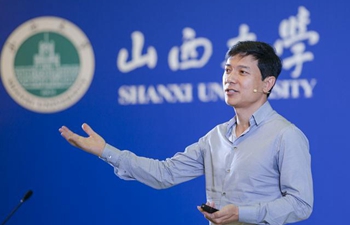NANCHANG, July 12 (Xinhua) -- Like most people in China, Abdulla Ghulashim stopped writing letters years ago. The telephone is the easiest way for him to chat to his 80-year-old mom.
Lately, however, he has picked up his pen to write to her again.
"I have so much to say about the past decades," he wrote. "If you like what I say in the letter, please share it with our friends and relatives."
Abdulla, 43, is a successful Uygur businessman in Nanchang, capital of eastern China's Jiangxi Province. He has 11 restaurants in the city, but things were not always easy.
TRUE FRIENDSHIP
Abdulla Ghulashim's name was too long for his Han friends, so they call him Ablajan instead, or even Adaxi, a Uygur word for friend.
"Without those Adaxi I could not be who I am now," he wrote.
Abdulla's hometown is a village in Hotan prefecture, northwestern China's Xinjiang Uygur Autonomous Region.
In 1997, he joined relatives east to sell raisins, a Xinjiang specialty. "Two yuan for one tael" was the first Mandarin sentence he learned.
"For quite some time it was also the only Mandarin sentence I knew," he said. It made for some strange conversations.
"How much are the raisins?"
"Two yuan for one tael."
"Great. Where are you from?"
"Two yuan for one tael."
"What the hell are you talking about?"
"Two yuan for one tael.
He soon found a place to live, and learned Mandarin before starting a business of his own.
He has never forgotten the kindness of strangers over three days in 2002, while waiting for a raisin delivery. In Xinjiang, he had sent the raisins ahead on a freight train, but the passenger train was faster than the freight train, so he had to patient until his produce arrived.
He had nothing to sell, so he just waited at the train station.
"Some people gave me bottled water. One guy even bought me some rice noodles," he recalled.
He couldn't pronounce the names of his Han friends, so in his mobile phone he stored their numbers under nicknames: "Big-tummy Bro," "Long Hair" or "Mr. Glasses."
In 2006, the raisin trade was struggling, so he went to Zhejiang to look for work.
At Xiaoshan coach station, he met a woman who offered to teach him how to make pancakes. He spent 10 days learning, but his Mandarin was still poor and he couldn't remember her name.
Several years later, he returned to Xiaoshan to look for her, only to find the old coach station gone and a tall building in its place. Though she was gone, he would never forget her.
Xu Yong was a police officer who worked near Nanchang railway station, and approached Abdulla in 2010 as vendors were banned from the railway station as the government tried to clean up the streets.
At first, he argued with Xu, but his attitude changed after Xu helped him find a place for a restaurant and became guarantor for the rent.
Abdulla truly began to understand the meaning of true friendship.
HAVING A BOTTOM LINE
"Although I have met many challenges in Nanchang, I remember what you told me: however difficult our life may be, we should hold the bottom line," Abdulla wrote in the letter to his mother.
His bottom line is to be a man of integrity.
So he never sold low-quality food at top-quality prices, over-charged or gave short weight, when he sold raisin or pancakes, or in the restaurant.
In 2011, he opened his first roast mutton restaurant in Tieluxi village. At the time, there were lots of roast mutton restaurants in Nanchang, but most seemed pretty miserable.
Abdulla visited them one by one to figure out why.
He finally worked out that they were not using fresh mutton, so decided to help Nanchang residents eat real, fresh Xinjiang roast mutton.
He travelled to a registered slaughter house in the suburb every morning where sheep were brought from Shandong Province.
"It costs 20 yuan to have a sheep slaughtered. Most restaurant owners are unwilling to pay the price, but Abdulla Ghulashim never saved that money," said Liu Guanghua, a slaughter house worker.
Bayi Square is the centerpiece of Nanchang, regarded now by Abdulla as his second hometown.
His restaurant now boasts 32 staff, all from Xinjiang. He taught them to make everything from "Nang", a staple bread for Uygurs in Xinjiang, to roast mutton. He even helped them learn Mandarin and rent stores to start their own businesses.
The letters to his mother have not stopped.
"I believe that I will have more friends here," he wrote. "Before Spring Festival, I visited five households living in poverty. After the holiday I visited 10 more, bringing them mutton and money. Mom, you are happy for me, aren't you?"

















